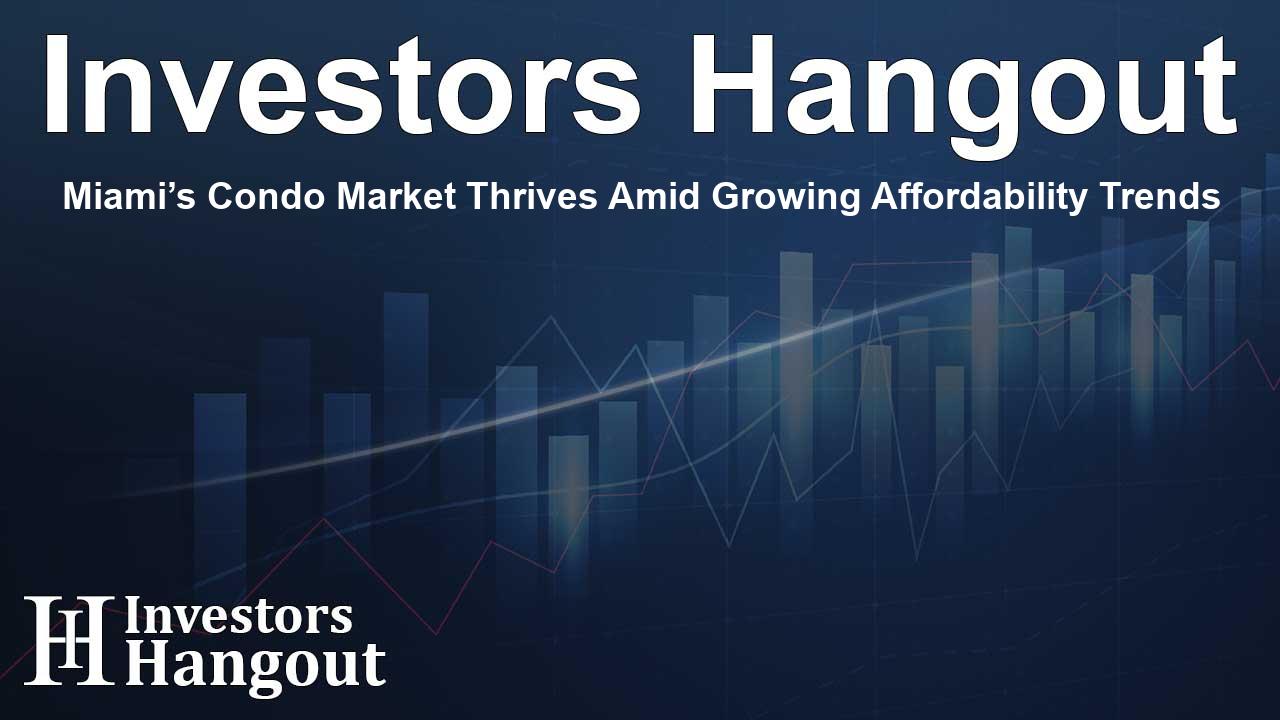Miami’s Condo Market Thrives Amid Growing Affordability Trends

Surge in Condo Sales in Miami-Dade County
Recently, Miami-Dade County has experienced a notable increase in condominium sales, particularly for units priced at $1 million and above. This surge highlights a strong demand for affordable 30-year condo units, making them appealing options for new homeowners. Statistics reveal that sales have surged significantly, showcasing an interesting trend in the real estate landscape.
Sales Growth and Market Dynamics
The data indicates a remarkable growth of over 10% year-over-year in sales of condos priced at $1 million and higher. In a recent period, the total number of units sold rose from 120 to 133. Interestingly, while the median price of 30-year and older condo units stood at approximately $280,000, it showed a slight decrease compared to $290,000 from previous metrics, reflecting stable demand in this price segment that resonates with first-time buyers.
Affordable Housing and Market Entry Opportunities
Eddie Blanco, the Chairman of the Board for Miami REALTORS, observed, "Older condos represent affordability and opportunity. They serve as the entry point into South Florida's competitive real estate market, with many located in desirable areas." The limited availability of land in South Florida further enhances the appeal of these properties, adding another layer to their investment value.
Impact of New Regulations on Older Condominiums
Recent regulations mandating inspections and adequate reserves for older condominium buildings came into effect in early 2025. These changes aim to ensure that properties meet safety and financial standards while enhancing the overall quality of Miami’s real estate inventory. Consequently, buildings that were previously difficult to finance will become more accessible, thus elevating buyer affordability.
Luxury Market Trends Show Wealth Migration
Alongside an increase in affordable units, Miami's higher-end market is also thriving. Transactions for condos priced at $5 million and above have seen double-digit growth, reflecting ongoing patterns of wealth migration toward South Florida. This trend highlights the appeal of the luxury market during a period of elevated mortgage rates.
Market Balancing Post-Pandemic
The overall real estate market in Miami is gradually moving toward balance after a period of rapid growth during the pandemic. Total sales have dipped, but this adjustment is seen as a positive development, allowing for healthier market dynamics. Industry analysts predict that an increase in inventory will ultimately benefit buyers seeking the right properties at competitive prices.
International Buyers and Construction Growth
International buyer activity has been robust, accounting for nearly half of new construction transactions. Reports indicate that Miami is increasingly becoming a hotspot for foreign investment, further driving the market appeal. Collaborations among various real estate entities have resulted in informative reports shedding light on these trends.
Future Predictions for Pricing and Sales
Future trends suggest that prices for single-family homes and condos will appreciate as demand remains strong. Despite a dip in overall price metrics from previous years, Miami remains an attractive option, offering more value per dollar compared to other major global cities.
Economic Impact of Real Estate Transactions
The economic ripple effect generated by real estate transactions is substantial. Each condo sold not only benefits real estate agents and associated industries but also fuels local economies through subsequent expenditures related to moving, remodeling, and surrounding services. In total, the economic contribution from condo sales in Miami-Dade is considerable, showcasing the integral role of real estate in local economic health.
Assessing the State of the Inventory
Despite an overall increase in active listings, the total inventory remains below pre-pandemic levels. This situation creates opportunities for homebuyers who are eager to secure favorable contracts in a changing market environment. The current inventory levels indicate a buyer's market, especially for existing condominiums.
Frequently Asked Questions
What has driven the surge in condo sales in Miami-Dade?
The surge in condo sales is attributed to the combination of affordability and demand for older units, making them attractive options for first-time buyers.
How do new regulations affect older condominiums?
The new regulations require inspections and maintenance reserves, enhancing property financing options and ensuring safety standards.
What current market trends are impacting luxury condo sales?
There has been a notable increase in $5 million and above condo sales, reflecting a trend of wealth migration to South Florida.
How does Miami's pricing compare to other global cities?
Miami remains competitively priced, offering more space for $1 million compared to cities like New York and London.
What is the economic impact of real estate sales in Miami?
Each home sale contributes significantly to the local economy through various sectors, driving growth and job creation.
About The Author
Contact Logan Wright privately here. Or send an email with ATTN: Logan Wright as the subject to contact@investorshangout.com.
About Investors Hangout
Investors Hangout is a leading online stock forum for financial discussion and learning, offering a wide range of free tools and resources. It draws in traders of all levels, who exchange market knowledge, investigate trading tactics, and keep an eye on industry developments in real time. Featuring financial articles, stock message boards, quotes, charts, company profiles, and live news updates. Through cooperative learning and a wealth of informational resources, it helps users from novices creating their first portfolios to experts honing their techniques. Join Investors Hangout today: https://investorshangout.com/
The content of this article is based on factual, publicly available information and does not represent legal, financial, or investment advice. Investors Hangout does not offer financial advice, and the author is not a licensed financial advisor. Consult a qualified advisor before making any financial or investment decisions based on this article. This article should not be considered advice to purchase, sell, or hold any securities or other investments. If any of the material provided here is inaccurate, please contact us for corrections.
